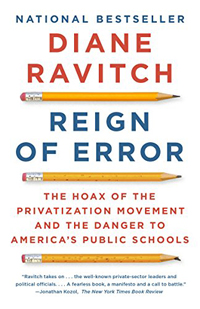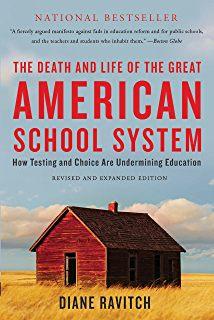Larry Glick, president of the Garland ISD board of trustees recently interviewed Dr. Diane Ravitch, an educational historian, research professor, founder and president of the Network for Public Education and New York Times best-selling author. Her list of accomplishments is long and she is a well- respected education expert. The questions were submitted by Garland ISD staff.
The first interview question was about standardized testing and glick read the quote below from Ravitch’s book “Reign of Error: The Hoax of the Privatization Movement and the Danger to America’s Public Schools.” Her opinion of standardized testing is obvious.
“As the current national obsession with testing intensifies, we can expect to see more testing, more narrowing of the curriculum, more narrowing of instruction to only what is tested, more cheating and less attention to teaching students to think, to discuss, to consider different ways to solve problems and to be creative.”
The questions was: “If a student takes a standardized test and demonstrates mastery, but cannot intelligently reapply those skills in another more complex and real context, has the child really learned anything?”
Ravitch replied that the easy answer is that if the student cannot apply what they can do on a standardized test, there is no learning happening. She also said that the more complicated answer is the nature of standardized testing.
“You can’t take an answer to a standardized test and call that a representation of learning. It is in a very superficial way. But deep learning is the ability to use and apply what you’ve learned,” she said.
Ravitch further explained that the problem with standardized tests is the multiple choice questions and short answers. The students should be able to demonstrate that they can do more than pick one of four multiple choice answers. They need to have the ability to think on their feet.
“For the future, we want people who can think for themselves,” she said. “Standardized tests will not prepare these children for that.”
Ravitch explained that tests have value only if they inform the teachers and they must be diagnostic.
“I’m opposed to the current type of testing,” she said. “It labels children and stigmatizes those who get low scores. It isn’t a diagnostic tool but a ranking tool.”
It ranks children by who is best and worst with scores and children have abilities that can’t be measured by tests.
“I know as a parent and now as a grandparent that every child is valuable and they can’t be measured simply by their test scores,” Ravitch said.
Glick then asked Ravitch what she thought John Dewey (famous educator, philosopher and psychologist) would be disappointed with about education in 2017 and what would he be pleased with.
“If John Dewey were alive today, I think he would be in a perpetual state of shock, first of all because the nature of learning…is experiential,” she said. “You learn by engaging ideas. He was not a person who believed that learning should be easy but that it should be complicated. It should be questioning. It should be thoughtful.”
She added that he would also be shocked…by the test-based accountability as well as the attacks against public schools.
Ravitch said that Dewy would be pleased that there are still people willing to teach and to address the needs of children who come from a variety of backgrounds.
“He would be overwhelmed by the dedication and the commitment of today’s teachers,” she said.
Glick then questioned Ravitch about the impact that charter schools are having on the public education system and how that impact can be decreased.
 Addressing online charter schools first, Ravitch said that they have been the worst performing schools in almost every state.
Addressing online charter schools first, Ravitch said that they have been the worst performing schools in almost every state.
“The fact is children need to interact with human beings. They need to interact with living teachers…In terms of full-time instruction, these virtual schools have turned out to be a massive scam. They have very high attrition,” Ravitch said.
She added that they typically lose 50 percent of their students every year and they are using taxpayer money to advertise to recruit students to refill the slots. Additionally, the instruction that students receive is subpar and the students get low test scores.
Ravitch believes that the purpose of online charter schools is to make money, not to educate children and she referred to them as the “walmartization” of American education.
“The fact that they get public money does not make them public,” she said. “They are private schools getting public money.”
The next question was about maintaining positivity in the current education climate.
“The most important thing to do is stay positive, think of all the good things that happen in schools and share it with the parents and the public,” she said. “Even where the test scores aren’t impressive, great things are happening.”
She advises being active and knowing what is happening in the legislature to ensure that the best interests of children are being addressed.
She finished the interview by emphasizing the value of all children.
“We have to have different ways of valuing children and also valuing children just because they are children,” Ravitch said. “If a child has special needs, they are not less valuable than a child who has a high test score.”
She added that we must get back to the idea that all children matter, all children are loved and all deserve instruction and that the job of educators is to help them become the best they can be.


